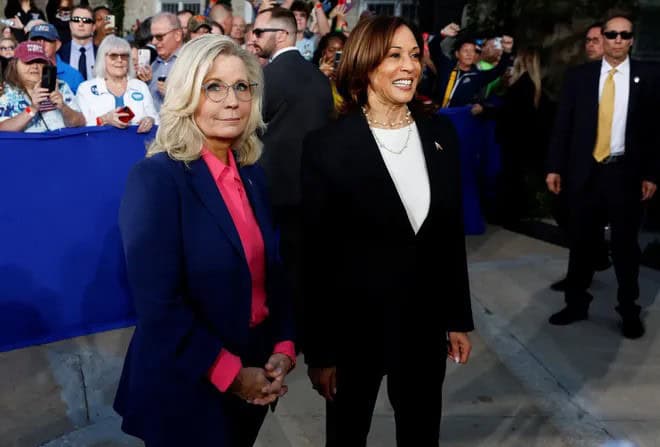WASHINGTON, D.C. – In a surprising show of bipartisan collaboration, Democratic presidential nominee Kamala Harris is making a targeted pitch to swing-state Republicans with a three-state tour alongside former Rep. Liz Cheney (R-Wyo.). The vice president will visit key suburban battlegrounds on Monday, stopping in Chester County, Pennsylvania; Oakland County, Michigan; and Waukesha County, Wisconsin.
Harris’s campaign stops will feature moderated discussions with Republican figures who have been vocal critics of Donald Trump, including Cheney, conservative radio host Charlie Sykes, and Republican strategist Sarah Longwell. The events aim to open dialogues with voters disillusioned by Trump’s continued influence over the GOP, particularly in these swing states that could decide the 2024 presidential election.
“Meeting the Moment”
Cheney, a staunch critic of Trump, has emerged as one of Harris’s most influential Republican supporters. Once a powerful figure in the GOP as the chair of the House Republican Conference, Cheney’s career took a different turn when she criticized Trump’s attempts to overturn the 2020 election results. Her public stance led to her ousting from GOP leadership and losing Wyoming’s House seat to a pro-Trump challenger. But it didn’t silence her voice.
“I’m urging my fellow Republicans to meet the moment,” Cheney said recently, encouraging voters to prioritize democracy over party loyalty. Her decision to endorse Harris, along with that of her father, former Vice President Dick Cheney, signals a strong Republican presence within Harris’s broader coalition of support.
According to a senior campaign official granted anonymity to preview the tour, the scheduled events are designed to foster conversations, not typical stump speeches. By opting for dialogue rather than traditional campaign rallies, Harris’s team hopes to signal a willingness to listen to and engage with Republican and independent voters who may be considering crossing party lines.
Focusing on Suburban Swing Counties
The three counties Harris will visit—Chester, Oakland, and Waukesha—are strategic choices. Each has a history of swinging between parties in recent elections and has seen significant suburban growth. The suburbs, in particular, are expected to be a crucial battleground in the 2024 election, as these areas were key to Joe Biden’s 2020 victory.
Chester County, Pennsylvania, which borders Philadelphia, has been trending Democratic but remains home to a considerable number of moderate Republicans. Oakland County, Michigan, a diverse and populous suburban area outside Detroit, has long been a bellwether county. Meanwhile, Waukesha County, Wisconsin, once a Republican stronghold, has shown signs of softening support for Trump, making it ripe for an appeal from candidates like Harris, who hope to build a cross-party coalition.
These visits come after Harris’s previous appeal in Pennsylvania, where she gathered more than 100 former Republican officials, national security experts, and aides who endorsed her candidacy over Trump’s. The campaign is emphasizing Harris’s readiness to work with Republican-leaning voters who value stability and the rule of law, even as the race remains sharply polarized.
Liz Cheney: The Unexpected Surrogate
Cheney’s presence on the campaign trail is noteworthy for her sharp criticisms of Trump and her role as vice chair of the House select committee investigating the January 6th Capitol riot. She was one of only 10 House Republicans who voted to impeach Trump following the attack and has since become an emblem of the “Never Trump” movement within the GOP.
Harris’s team sees Cheney as a valuable asset, given her credibility among conservative voters who have grown weary of Trump’s rhetoric and behavior. “Liz Cheney’s voice carries weight with a segment of the electorate that feels politically homeless,” said a senior Harris campaign strategist. “Her endorsement signals to swing voters that it’s okay to consider a Democrat in this election.”
A Broadening Coalition
Sarah Longwell and Charlie Sykes, two influential figures in anti-Trump conservative circles, will moderate the events. Longwell, the founder of the Republican Accountability Project, has spent the past few years rallying Republicans to oppose Trump’s influence. Sykes, a longtime conservative radio personality in Milwaukee, has shifted from a staunch GOP supporter to one of Trump’s most vocal critics.
“Opposing Trump isn’t enough,” Sykes recently stated, emphasizing the need for Republicans to support candidates who can maintain democratic norms actively. His endorsement of Harris echoes a growing sentiment among moderate conservatives that the stakes in 2024 are too high for indifference.
Trump’s Counterattack
As Harris and Cheney prepare to take their appeal to key swing-state voters, the Trump campaign is working to shore up its support. In a potential counter-rally, Trump’s team is coordinating an event with Nikki Haley, his former rival in the GOP primary who recently endorsed him. This underscores the urgency on both sides to win over critical suburban voters who could swing the election.
For Harris, the collaboration with Cheney and other anti-Trump Republicans is a gamble. Still, it’s rooted in the belief that enough disaffected GOP voters exist to make a difference in swing states. Whether this bold strategy will pay off remains to be seen, but it’s clear that Harris is not shying away from the challenge of appealing to voters beyond her party’s base.

